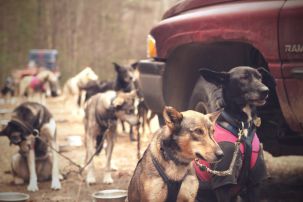The Government has announced that it is looking at introducing new dog control legislation targeting specific breeds and types of dogs in an effort to reduce the number of dog attacks. We look at local reaction to the proposal and how breed-specific legislation has played out overseas.
What is being proposed in New Zealand?
Associate Minister of Local Government Louise Upston aims to introduce a bill to Parliament in early 2017 to toughen restrictions on dogs deemed dangerous or menacing.

Currently, New Zealand's Dog Control Act bans the importation of Brazilian Fila, American Pitbull Terrier, Japanese Tosa, Dogo Argentino, and Presa Canario, and requires these dogs be muzzled while out in public and be microchipped. Local councils may also require them to be neutered.
The proposed new legislation will apply to these breeds and types of dogs as well as individual dogs that have shown aggressive behaviour and have been deemed a risk by local councils.
Under the proposed legislative changes, classified dogs will face mandatory neutering and will have to wear collars that identify them as menacing or dangerous. Owners of classified dogs will have to securely fence their properties and display signs that clearly mark that there is a dangerous or menacing dog on site. The dogs will have to be kept in a fenced-in area on their property that allows visitors dog-free access to at least one entrance to the house. Animal shelters such as the SPCA will also be banned from adopting out classified dogs to new owners.
Ms Upston says the proposals came after months of meetings with people with knowledge and experience of working with dogs, including local councils, plastic surgeons, veterinarians, dog behaviour experts, the SPCA and dog attack victims.
Opponents say the Minister is barking up the wrong tree
The SPCA isn't a fan of breed-specific laws, saying dogs should be judged on their individual behaviour and temperament. Dr Arnja Dale, Chief Scientific Officer of the SPCA New Zealand also says correctly identifying if a dog is a certain breed is tricky, calling the visual assessment of breed "subjective and biased and inaccurate even by experienced professionals".

Anita Killeen.
Anita Killeen, who is a barrister at Quay Chambers in Auckland, a director of the Auckland SPCA, and also chairs the Pro Bono Panel of Prosecutors for the SPCA Auckland, says breed-specific legislation is not effective in reducing dog bites.
"Wherever breed specific legislation has been implemented, it has not been shown to reduce public risk and is likely to create even more risk of harm from dogs, due to the incorrect belief that dogs other than those that have been banned are 'safe'."
Ms Killeen says all dogs have the potential to bite and studies have shown that the tendency of a dog to bite is made up of several factors, including its individual genetic makeup, socialisation, training experiences, physical and psychological health and the context of the incident including the behaviour of the victim and dog handler.
Instead of focusing on specific breeds, Ms Killeen says the law should instead look at dog owners.
"Breed-specific legislation disregards the potential negative influence of dog owners. Inappropriate owners who want an aggressive dog can encourage that behaviour in many dog types, whether those dogs are banned or not. Negative deeds of some owners and dogs should be managed and legislated against."
Most fatal dog attacks in the UK not caused by restricted breeds: RSPCA
The United Kingdom introduced the Dangerous Dogs Act in 1991, which bans certain breeds of dogs, following a spate of high profile dog attacks on children.
Since the Act was introduced, 31 people have been killed in dog-related incidents, according to the RSCPA. Of those 31 deaths, 21 involved dogs that were not of the breeds prohibited by law.
"Aggression is not simply a product of breed and breed isn't a reliable predictor of aggression. As a behaviour, aggression is very complex. Whether or not a dog uses aggression is influenced by a range of factors including how they were bred and reared and their experiences throughout their lifetime," the RSPCA said in a report called RSPCA: Breed Specific Legislation: A Dog's Dinner.
The UK introduced the Dangerous Dogs Act after a number of high-profile dog attacks on children. The RSPCA is calling for a government inquiry into the effectiveness of the law, saying a steady increase in dog bites in the UK shows the intended effect of the Act in enhancing public safety is "failing and will continue to fail".
Loosening breed specific restrictions in Australia
Australia currently bans the importation of specific breeds - Dogo Argentino, Perro de Presa Canario, Fila Brasileiro (Brazilian Mastiff), Pitbull Terrier, Japanese Tosa – and requires all dogs of those breeds to be de-sexed in an attempt to eventually eliminate the population.
Other restrictions and legislation vary depending on the state or territory, but in Victoria the state government has recently announced plans to reverse a ban on registering dangerous dog breeds. The ban was introduced in 2011 after a four-year-old girl was mauled to death. It meant that classified dogs that had not previously been registered in the state could not become registered – and all unregistered classified dogs had to be euthanised.
Following a Victorian Parliamentary Inquiry, the state's Agriculture Minister Jaala Pulford said the ban had been ineffective and would be reversed. "Despite the ban on restricted breeds, there are still many dangerous dogs in the community, whilst other dogs known to be safe have been put down," Ms Pulford said.
Owners of restricted breeds would still need to adhere to strict requirements. These include displaying a warning sign at the entrance to their property, keeping dogs muzzled and on a leash when out in public, making sure dogs are de-sexed and microchipped, and making sure properties are fenced and escape-proof.
